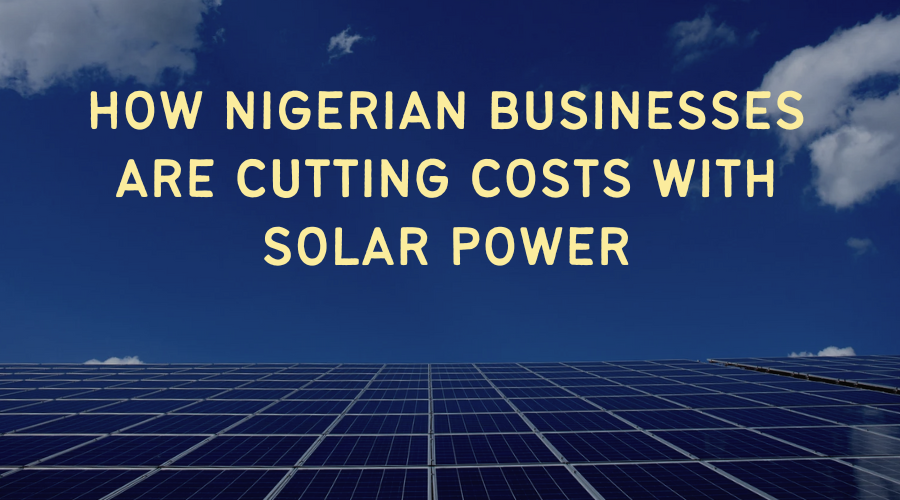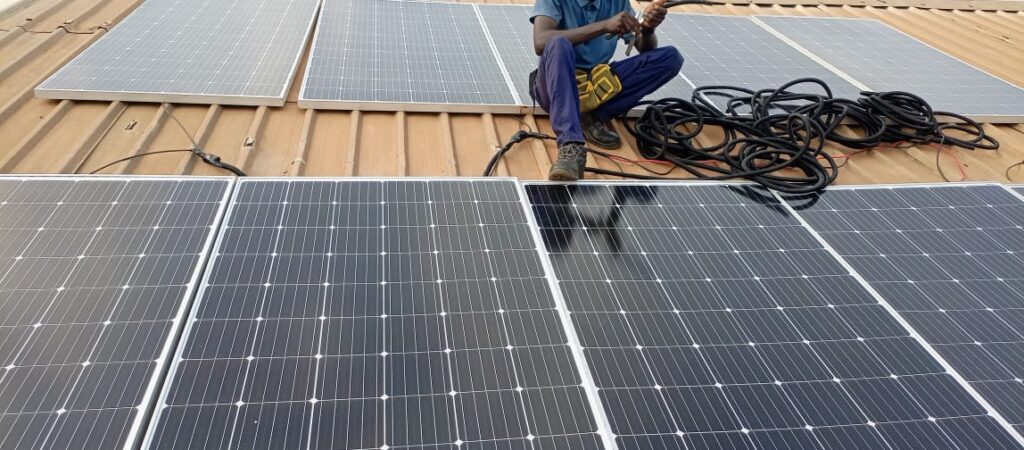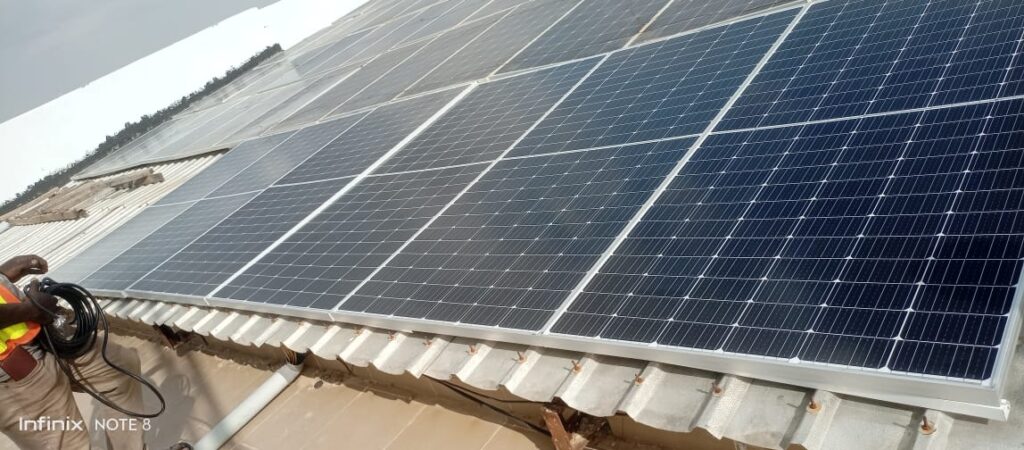It’s another scorching Lagos afternoon, and your shop’s air conditioning is working overtime whilst your generator chugs away in the background, burning through diesel like there’s no tomorrow.
Meanwhile, just down the street, your competitor’s shop stays cool and comfortable, their machines humming quietly all powered by the same Nigerian sun that’s been beating down on both of you.
The difference? How Nigerian businesses are cutting costs with solar power has become their secret weapon for staying profitable in today’s tough economy.
From small corner shops in Kano to manufacturing plants in Port Harcourt, savvy business owners across Nigeria are discovering what international companies have known for years: solar power isn’t just environmentally friendly it’s financially brilliant.
But here’s what most people don’t realise about this solar revolution happening right under our noses.
Table of Contents
THE NIGERIAN BUSINESS REALITY: WHY SOLAR MAKES PERFECT SENSE

The Power Problem That’s Costing You Millions
Let’s be honest if you’re running a business in Nigeria, you’ve probably got a love-hate relationship with electricity. Actually, scratch that. It’s mostly hate, isn’t it?
Between NEPA’s unpredictable supply and the rising cost of diesel for generators, keeping your business powered up feels like feeding a very hungry, very expensive monster.
The average Nigerian business spends between ₦500,000 to ₦2 million annually on generator fuel alone. That’s money that could be going straight to your bottom line.
But here’s where it gets interesting. Whilst you’ve been cursing the darkness (literally), some of your competitors have been getting clever with the light solar light, to be precise.
THE SOLAR SUCCESS STORIES YOU HAVEN’T HEARD ABOUT
Take Kemi’s Fashion House in Victoria Island. Last year, she was spending about ₦250,000 monthly on diesel for her generator. Her sewing machines, pressing equipment, and shop lighting were draining her profits faster than she could make them.
Today? Her monthly electricity costs have dropped to ₦15,000—and that’s including her grid connection for backup.

The solar installation paid for itself in 18 months, and now she’s saving over ₦780,000 annually. That’s almost a million naira she can reinvest in her business every year.
Or consider Chief Adebayo’s cold storage facility in Ibadan. His business was hemorrhaging money on diesel—₦400,000 monthly just to keep his freezers running.
After installing a hybrid solar system, his energy costs dropped by 75%. He’s now expanding his business with the money he’s saving.
Go Solar Today!
Ready to slash your electricity bills and boost your bottom line? Join hundreds of Nigerian businesses already saving thousands with solar power. Our expert team will design a custom solar solution that fits your budget and energy needs.
BREAKING DOWN THE NUMBERS: SOLAR ROI FOR NIGERIAN BUSINESSES
The Real Cost of Staying on the Grid (Plus Generator)
Let’s do some quick maths that’ll make your accountant weep:
| Business Type | Monthly Generator Cost | Annual Cost | 5-Year Cost |
| Small Shop | ₦45,000 | ₦540,000 | ₦2,700,000 |
| Medium Workshop | ₦120,000 | ₦1,440,000 | ₦7,200,000 |
| Small Factory | ₦350,000 | ₦4,200,000 | ₦21,000,000 |
Now, here’s the beautiful part about solar: after the initial investment, the sun sends you free electricity for the next 25 years.
No diesel costs, no maintenance headaches, no generator noise disturbing your neighbours.
SOLAR INSTALLATION COSTS VS LONG-TERM SAVINGS
A typical small business solar setup (5-10kW) costs between ₦2.5 million to ₦5 million for a quality installation.
Yes, that sounds like a lot upfront—but remember Chief Adebayo? He recovered his investment in under two years.
Here’s the breakdown for a medium-sized business:
Initial Investment: ₦3.5 million Monthly Savings: ₦180,000 Payback Period: 19 months 25-year Savings: ₦52.5 million (minus initial cost = ₦49 million profit)
TYPES OF SOLAR SOLUTIONS PERFECT FOR NIGERIAN BUSINESSES
Grid-Tied Systems: The Smart City Solution
If you’re in areas with relatively stable grid power (Lagos Island, parts of Abuja), a grid-tied system might be your best bet.

During the day, your business runs on solar power, and any excess goes back to the grid. When the sun goes down or on cloudy days, you seamlessly switch to grid power.
Best for: Offices, shops, and businesses with predictable daytime operations.
Off-Grid Systems: Complete Energy Independence
For businesses tired of depending on anyone else for power, off-grid systems offer complete energy independence.
These systems include battery storage, so you’re covered even during those harmattan season dust storms that block the sun.
Best for: Remote locations, businesses requiring 24/7 power, or areas with extremely unreliable grid supply.
Hybrid Systems: The Best of Both Worlds
Hybrid systems combine grid connection, solar panels, and battery backup. Think of it as having three different power sources—you’ll always have electricity, no matter what.
During sunny days, solar powers your business and charges your batteries. When the grid is stable, it supplements your power and charges batteries. When both fail, your batteries keep you running.
Best for: Critical operations like hospitals, cold storage, or any business that can’t afford downtime.
INDUSTRY-SPECIFIC SOLAR APPLICATIONS
Manufacturing and Production
Nigerian manufacturers are discovering that solar power isn’t just about cost savings—it’s about reliability. Production lines that used to shut down during power outages now run continuously.
Success Story: A textile manufacturer in Kaduna installed a 50kW solar system. Their production capacity increased by 30% simply because they eliminated downtime from power outages.
Retail and Hospitality
Shops, restaurants, and hotels are finding solar power transforms their customer experience. No more apologising for warm drinks because the freezer went off, no more losing customers because the air conditioning failed.
Agriculture and Cold Storage
For agribusiness, solar power is revolutionary. Cold storage facilities, processing plants, and irrigation systems can now operate reliably, reducing post-harvest losses that cost Nigerian farmers billions annually.
GOVERNMENT INCENTIVES AND SUPPORT
The Central Bank of Nigeria (CBN) Intervention Funds
The CBN’s Solar Power Intervention Fund offers single digit interest rates for solar installations. This means you can start saving money immediately whilst paying for your system over time.
Import Duty Exemptions
Solar equipment imports enjoy reduced duties under Nigeria’s renewable energy policies. This makes quality solar components more affordable than ever.
Local Content Development
The Nigerian Content Development and Monitoring Board (NCDMB) is actively supporting local solar manufacturing and installation capacity. This means more local jobs and reduced installation costs.
CHOOSING THE RIGHT SOLAR PARTNER
Red Flags to Avoid
Beware of companies that:
- Promise unrealistic payback periods (anything under 12 months is suspect)
- Use only Chinese components without local support
- Don’t offer comprehensive warranties
- Can’t provide local references
What to Look For
Choose installers who:
- Have been in business for at least 3 years
- Provide detailed energy audits before quoting
- Offer comprehensive warranties (minimum 10 years on panels)
- Have local service and maintenance capability
- Can provide financial performance guarantees
MAINTENANCE AND LONG-TERM CONSIDERATIONS
The Beauty of Solar: Minimal Maintenance
Unlike generators that need constant attention, solar systems are remarkably low-maintenance. A monthly cleaning and annual professional check-up are usually sufficient.
Battery Considerations
If your system includes batteries, expect to replace them every 5-10 years depending on usage and quality. Factor this into your long-term calculations.
Performance Monitoring
Modern solar systems include monitoring apps that show exactly how much electricity you’re generating and saving in real-time. It’s quite satisfying watching your savings accumulate!
Future-Proofing Your Business
Scalability
Start with what you need now, but choose a system that can grow with your business. Most quality installations can be expanded easily.
Technology Advances
Solar panel efficiency continues to improve whilst prices drop. Battery technology is also advancing rapidly, making energy storage more affordable.
RELATED: LAN SETUP FOR BUSINESSES IN LAGOS BY COHERLIN LIMITED
CARBON CREDITS AND ESG
As international businesses increasingly focus on Environmental, Social, and Governance (ESG) criteria, having renewable energy can make your business more attractive to partners and investors.
Real Business Impact: Beyond Cost Savings
Improved Cash Flow
Predictable energy costs make financial planning much easier. No more budget surprises from fuel price increases.
Enhanced Productivity
Reliable power means consistent production, better customer service, and the ability to operate during peak business hours regardless of grid conditions.
Competitive Advantage
Lower operating costs mean you can offer better prices whilst maintaining healthy profit margins.
Brand Enhancement
Being seen as environmentally responsible and forward-thinking enhances your business reputation.
COMMON MYTHS AND MISCONCEPTIONS
“Solar Doesn’t Work During Harmattan”
Truth: Solar panels actually work more efficiently in cooler temperatures. Yes, dust reduces output, but regular cleaning maintains performance.
“Solar Is Too Expensive”
Truth: The total cost of ownership over 25 years makes solar significantly cheaper than generator power.
“Batteries Don’t Last in Nigerian Heat”
Truth: Quality lithium-ion batteries with proper installation and ventilation perform well in tropical climates.
“You Need a Lot of Space”
Truth: Modern panels are highly efficient. A 10kW system needs only about 60 square metres of roof space.
TAKING ACTION: YOUR SOLAR JOURNEY STARTS NOW
Step 1: Energy Audit
Calculate your current energy costs and usage patterns. Most solar companies offer free energy audits.
Step 2: Multiple Quotes
Get quotes from at least three reputable installers. Compare not just price, but warranty terms and component quality.
Step 3: Financing Options
Explore CBN intervention funds, commercial bank green loans, and installer financing options.
Step 4: Installation Planning
Work with your chosen installer to plan the installation with minimal business disruption.
THE BOTTOM LINE: YOUR FINANCIAL FUTURE DEPENDS ON THIS DECISION
Here’s the uncomfortable truth: whilst you’re reading this article, your competitors might already be installing solar systems.
Every month you delay is another ₦50,000, ₦100,000, or ₦500,000 (depending on your business size) going straight to diesel vendors instead of your business growth.
The businesses thriving in Nigeria’s challenging economic environment aren’t the ones hoping for better grid power or cheaper diesel. They’re the ones taking control of their energy destiny.
Your Next Step?
Don’t let another month of high energy costs drain your profits. Contact Coherlinlimited; we are a reputable solar installer and get a free energy audit.
Calculate your potential savings. See for yourself why smart Nigerian businesses are making the switch.
The sun rises every day in Nigeria. The only question is: will you harness it to power your business success, or will you keep feeding the diesel monster?
Your future self and your bank account will thank you for making the smart choice today.
Ready to join the solar revolution? Share this article with fellow business owners who are tired of high energy costs. Together, we can build a more prosperous, energy-independent Nigerian business community.
